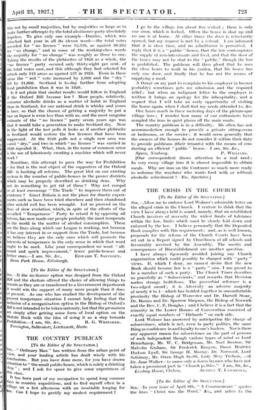THE COUNTRY PUBLICAN
[To the Editor of the SPECTATOR.]
he
he 11' JC1 ly
id
Soli--" Ordinary Man " has written froth the urban point of slew, and your leading article has dealt wisely with his conclusions. But you have done more, for you have drawn attention to " the small public-house, which is solely a drinking shop " ; and I ask for space to give some experiences of this class.
It has been part of- my occupation to spend long summer days in country expeditions, and to find myself often in a ''llage on a hot afternoon with an insatiable longing for lea- Can I hope to gratify my modest requirement ? I go to the village inn about five o'clock ; there is only one door, which is locked. Often the house is shut up and no one is at home. At other times the door is reluctantly opened, but my request is met by a refusal. I am informed that it is close time, and no adinittanee is permitted. I reply that it is a " public "-house, that the law contemplates the supply of non-intoxicants and food, and that the door of the house may not be shut to the " public," though the bar is prohibited. The publican will then plead that he uses the close hours to work in his garden, that his house has only one door, and finally that he has not the means of supplying a meal.
A threat on my part to complain to his employer (a brewer probably) sometimes gets me admission and the required relief ; but when an indignant letter to the employer is written it brings an apology for the inhospitality, and a request that I will take an early opportunity of visiting the house again, when I shall find my needs attended to, &c.
One hears much in these motoring days of the picturesque village inns ; I wonder how many of our enthusiasts have sampled the inns in quiet places off the main roads.
The country publican is in a difficulty. He often has not accommodation enough to provide a private sitting-room or bedrooms, or the service ; it would seem generally that the owners of the houses do not consider it within their duty to provide publicans (their tenants) with the means of con- ducting an efficient " public " house.-- I am, Sir, &c.,
[Our correspondent draws attention to a real need : In very many village inns it is almost impossible to obtain meals. Why are inns on the Continent so much more ready to welcome the wayfarer who wants food with or without alcoholic refreshment ?—En. Spectator.]










































 Previous page
Previous page